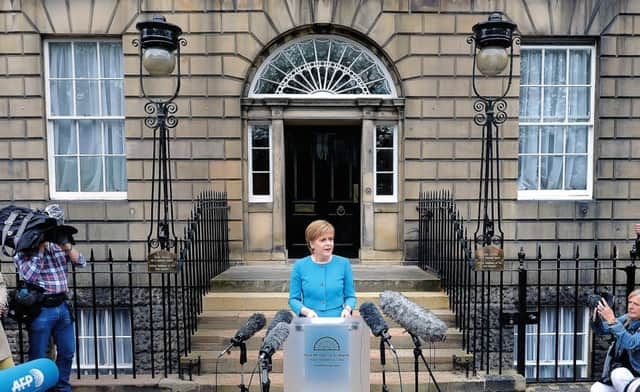Leader: Sturgeon must find out whether Scotland can join EU


While a second independence referendum was described as “highly likely”, there was enough in her overall message to avoid that option sounding as if it was retribution, or indeed the only alternative to Brexit, as the First Minister spoke of finding ways to secure Scotland’s position within Europe.
Of course, independence is the raison d’être of her party, so it is to be expected that she would put a referendum on the table as Scotland looks for the way ahead, but she has made it clear that there are several stages of discussion and investigation to be addressed before any attempt would be made to put a second referendum into practice.
Advertisement
Hide AdAdvertisement
Hide AdIt is quite possible that a second referendum is cut off at the pass. On the one hand, it is not inconceivable that Article 50, which triggers a UK exit, is never executed. If our new prime minister decides to go back to the EU and negotiates a stronger settlement than his predecessor extracted, then the Leave vote will have served its purpose as a bargaining tool, without having to implement withdrawal. On the other hand, the EU might kick the UK out of the union so fast that there is no time left for the Scottish Government to attempt further constitutional change which would coincide with Brexit, a time when the EU is most likely to consider continued Scottish participation. Even the two-year divorce between the UK and the EU is a tight timescale to organise and hold an independence referendum.
Sturgeon continued making the right noises yesterday, by offering reassurance to EU citizens already living in Scotland and reaching out to consuls general of all EU member states with a presence in Scotland.
The key to the strategy she proposes for Scotland, however, is the outcome of her intended talks with European President Jean-Claude Juncker, and with each EU member state. The First Minister should, through this process, be able to resolve one of the questions which voters wanted answered before the 2014 independence referendum: would Scotland be a member of the EU if it was independent? Two years ago, the opinion of senior figures within the EU was that Scotland would not be admitted.
In a multi-question EU opinion poll conducted by Scotland On Sunday in March, the most conclusive finding was that in the event of Brexit and Scotland voting to remain, 67 per cent of those asked said they would want to know if Scotland would definitely remain a member of the EU before a second independence referendum was to take place. That was three months ago, but there is no reason to believe that mood has changed.
Without certainty over EU membership, a second referendum should not take place. It is up to the First Minister, having put a re-run on the table, to find out the answer. The last thing any of us need post-Brexit is the prospect of facing another leap into the dark.